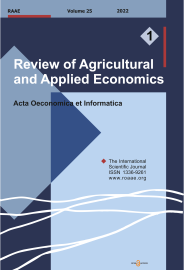KEYWORDS:
quality of life; cocoa farm workers; choice experiment approach
DOI NUMBER:
10.15414/raae.2021.24.01.56-63
ABSTRACT:
Research background: Cocoa remains the Nigeria’s highest foreign exchange earner among all agricultural commodities, Contributed 12.5-14% of the national GDP. Currently, Nigeria is the fourth largest cocoa producing country in the world, produced approximately 328,652 tons annually. Occupational risk is a major factor reducing productivity of farm workers as it impairs physical capacity and increase vulnerability to ill health, diseases and injuries. Risk of agrochemical exposure has been attributed to work demand and unhealthy work environment.Purpose of the article: This study aimed to estimate life quality for agrochemical exposure risks of cocoa farm workers in Ondo state Nigeria. The study specifically estimates the amount an individual willingness to pay by respondents for occupational risk reduction.
Methods: Multistage sampling technique that guaranteed cocoa farmers who could provide desired information on the basis of the objectives of the study was adopted for the study. Random selection of 180 cocoa farm workers from the study area. Descriptive statistics (frequency, mean and percentage) and Discrete Choice Experiment (DCE) approach that dovetailed into choice modelling and conditional logistic regression were the analytical tools used.
Findings & Value added: the result revealed that 74% of the cocoa farm workers are on active age and mainly male with the mean age of 46 years. Most of the workers are illiterate that cannot read instructions on the agrochemical container. Average workers are willing to pay 830 Nigerian naira for personal protective equipment, 92 Nigerian naira for 15% wage discount as financial benefit of workplace injuries and 1024 Nigerian naira for training of workers in pesticide usage. The study concluded that better health conditions and appropriate use of personal protective equipment minimize the occupational risk. It was therefore recommended that educational programmes that will enhance farmer’s knowledge, skills and attitude to use safe methods (appropriate use of protective equipment) in pesticide usage should be adequately planned. Appropriate use of personal protective equipment to reduce exposure to agrochemicals and the risks involved in the misuse and abuse of agrochemicals should be adopted.
Please Cite this Article as:
Damilare FADIJI, Luke OKOJI, Dare AKERELE (2021) Quality Of Life For Occupational Risks Of Cocoa Farm Workers In Nigeria. Review of Agricultural and Applied Economics. XXIV (Number 1, 2021): 56-63. doi: 10.15414/raae.2021.24.01.56-63
URL for sharing:
https://roaae.org/1336-9261/doi/abs/10.15414/raae.2021.24.01.56-63
FULL TEXT PDF:
▼ direct download link| view online in fullscreen ▲
References:
▼ direct download link

